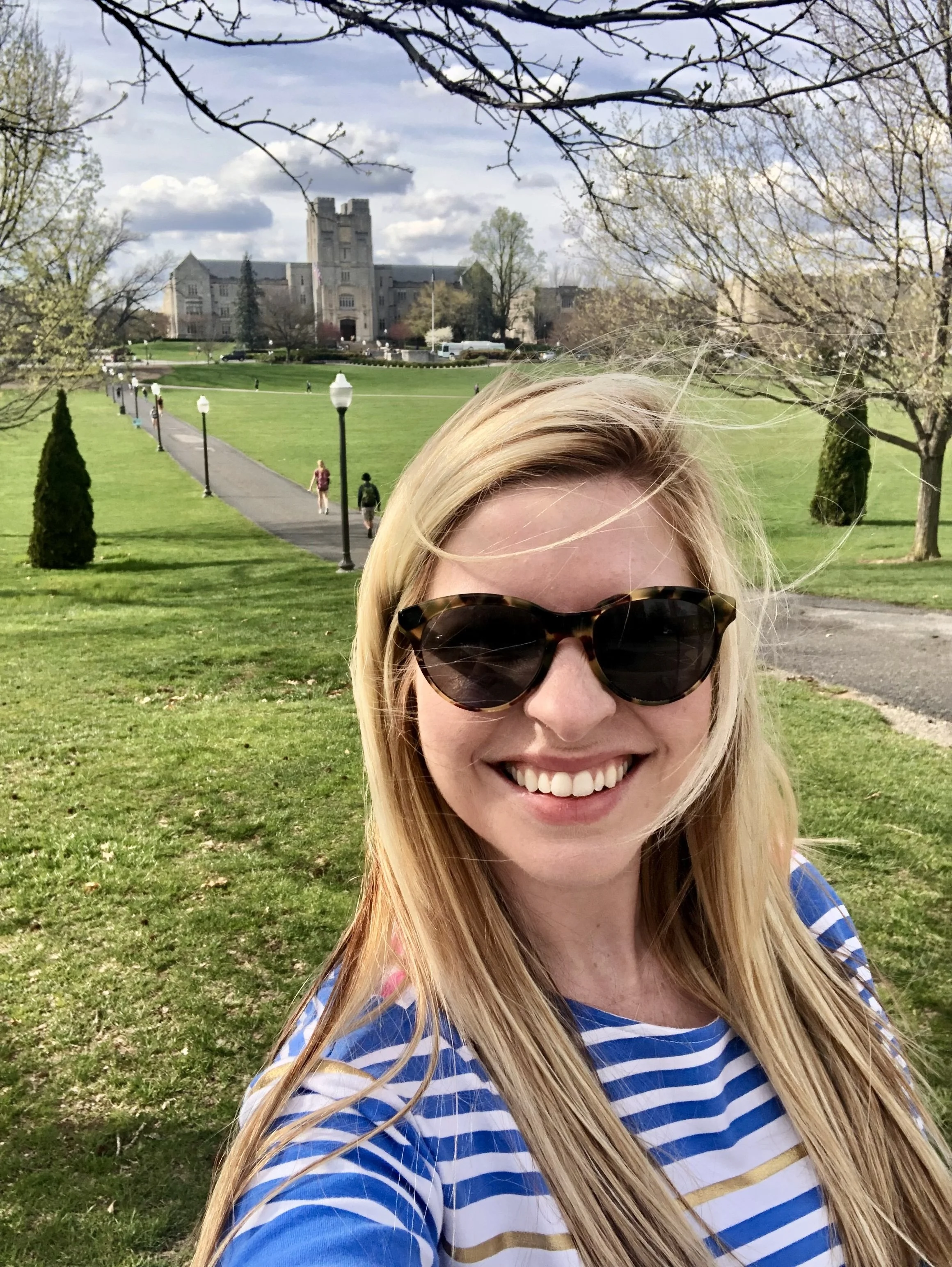When most students think about college essays, they start with the Common App® personal essay – and that makes sense. But that’s just the beginning! Most schools also require supplemental essays, which are designed to assess how well an applicant might fit within the institution’s academic programs and campus culture.
There is a pretty broad range of possible essay topics for these, and we work with our students to prepare what we call “generic supplemental essay” content in advance. We’ve found that most supplemental prompts fall into about five big themes, so we help students write strong responses to those ahead of time. We tackle these before most prompts even come out. That way, students already have solid content they can tweak to fit each school’s version.
But there’s one type of essay that’s tough to reuse – and it also happens to be the trickiest: the “Why This School?” essay. These prompts usually ask why you’re interested in a specific institution (or the undergraduate division of your choice at that institution), what you’d get out of being there, how you’d contribute to campus life … or all of the above!
These prompts are designed not only to test whether you’ve researched the school, but also to help admissions officers understand how you might contribute to campus life in meaningful ways – beyond simply earning good grades (that’s a given!).
At DCCC, our students work one-on-one with coaches to develop personalized, well-researched responses to every school on their list – so they're fully supported throughout this process. But if you're just getting started, or you're trying to help your student tackle these essays on your own, here are some common mistakes to avoid – and a preview of the kind of guidance our families receive along the way.
Mistake #1: Copying the Website
Weak: I am excited to join Clemson’s engineering program for its excellent research opportunities, study abroad offerings, and hands-on work experience.
Sure, those are good reasons to want to attend Clemson … and they are practically ripped right from the home page of the College of Engineering, Computing, and Applied Sciences site. There’s nothing really special here, either – after all, most engineering programs offer research, study abroad, and experiential learning opportunities.
We guide our clients through this research process to make sure they’re finding really valuable and specific information. Consider the following: Are there faculty whose work aligns with your interests? Specific research projects that excite you? A study abroad program, club, or competition team you'd love to join?
And just listing features isn’t enough – you need to explain why these matter to you personally.
Better: As a student pursuing a career in aerospace engineering, I’m especially excited about the chance to join Clemson’s Rocket Engineering (CURE) team. The opportunity to help design and machine rocket components as an undergraduate is exactly the kind of hands-on experience I’m seeking! I’m also drawn to the team-based structure of CURE, which reflects the type of collaborative environment I grew to love on my high school robotics team.
Mistake #2: Putting Too Much Emphasis on the Prestige
Weak: I can’t wait to attend Yale University, as graduating from an Ivy League school will afford me incredible opportunities after college.
You’re not wrong – but Yale doesn’t need you to remind them of their prestige. A statement like this suggests you’re more interested in the Ivy League brand than in Yale itself. Admissions officers want to see that you’ve done your research – and that you’re drawn to Yale for reasons beyond its reputation.
What programs or departments are you excited about? Are there specific faculty members you’d like to study with, research opportunities you want to pursue, or campus traditions that genuinely appeal to you? It’s fine to admire a school’s status, but you need to connect that admiration to something personal, thoughtful, and specific.
Better: While Yale’s global reputation first caught my attention, I’m especially drawn to the sociology department’s focus on culture, power, and social change. In high school, I launched a storytelling project in which students shared family migration stories. It showed me how narrative can shift public understanding – something I hope to explore further through courses like “Narratives of Social Protest” and research at the Ethnography Hub. Yale’s emphasis on discussion-based learning and faculty-mentored research will prepare me for a career in public policy, where I can use storytelling to shape more equitable systems. I can already picture myself walking across Old Campus in the fall on my way to a seminar on activism and identity!
Mistake #3: Forgetting to Talk About Yourself
Weak: The U-M Undergraduate Research Opportunity Program (UROP) is a unique opportunity to work alongside faculty on meaningful projects.
Sure – Michigan is the #1 public research university, and UROP is an incredible opportunity. But the concept of undergraduate research isn’t all that unique, so what’s special about UROP? Plus, how does this actually serve you? What kinds of projects are you excited about and why? Is there a specific lab, professor, or research topic that aligns with your interests? Just describing what the university offers isn’t enough – you have to connect it to your own goals, values, and curiosity.
While it’s important to do your homework when writing these essays, don’t forget to keep the focus personal.
Better: I plan to major in exercise science because I’m interested in exploring how physical activity can help people stay healthy as they age. After seeing my grandfather regain strength through a rehab program after heart surgery, I wrote my IB Extended Essay on how aerobic exercise affects blood vessels in older adults. That’s why I was so excited to learn about Dr. Lane’s research in the Lifestyle, Exercise, and Arteries Lab! Through UROP, I’d love to join his team and get hands-on experience studying how aging affects the cardiovascular system.
Mistake #4: Being Too General
Weak: Brown’s innovative education program is fascinating, and I love the strong sense of community.
I’m not sure there’s a single college in existence that wouldn’t advertise its education as “innovative” or try to sell you on its strong sense of “community”! In other words, you could swap out “Brown” for almost any other school and this statement would still work – which is exactly the problem!
If your sentence could apply to 50 different colleges, it’s not doing its job. Strong “Why Us?” responses are specific and precise. They highlight particular programs, courses, professors, or traditions that connect to your goals and interests.
The best essays come from students who know what they’re looking for in a college – and have taken the time to find where those things exist. So before you write, reflect on what matters most to you, then research how each school specifically supports the kind of experience you’re hoping to have.
Better: Brown’s Open Curriculum will let me combine Africana Studies and Architecture to explore how design impacts Black communities. Growing up, I noticed how poorly planned buildings and public spaces shaped everyday life – from crowded bus stops to schools that felt more like holding spaces than places to learn. Courses like “Race and Space,” paired with studio work and faculty mentorship, will help me design with equity in mind. I can’t wait to join the tight-knit, collaborative community where students are encouraged to connect big ideas with real-world change.
Mistake #5: Procrastination
I don’t need to give an example here – because any last-minute “Why This School?” essay is almost guaranteed to be weak. It takes time, research, and reflection to craft these well, and there is no one-size-fits-all formula for this type of essay. Each school phrases the question a little differently, and each response needs to show that you’ve thought seriously about your fit with that institution.
Plus, if you haven’t figured out what you’re actually looking for in a college experience, it’s going to be tough to answer these prompts in a meaningful way. That’s why our students work with their essay coaches early and often to build strong, tailored responses.
Not a DCCC student? You can still get ahead by making a spreadsheet or simple list of your colleges and doing some focused research. For each school, jot down a few specific answers to questions like:
What’s a class, major, or department offering that excites you – and why?
Is there a student org, tradition, or campus value that resonates with your background experiences or future plans?
How could you see yourself contributing to that community?
Bottom line: Don’t wait until the last minute. Strong essays aren’t rushed – they’re built.
Final Tips
1. Read the prompt very carefully.
Not all “Why This School?” questions are created equal. Some schools ask why you’re interested in the university as a whole, while others focus only on the specific undergraduate division you’re applying to. Some want academic reasons; others care more about how you’ll contribute to the campus community. Tailor your answer to what’s actually being asked.
2. Write like yourself.
Just like the Common App® personal essay, your supplemental responses should sound like you. These essays are often shorter and a bit more focused, which can give you room to write in a more casual, conversational tone – while still staying polished and purposeful. Enthusiasm, a personal touch, and clear writing all go a long way.
3. Prioritize clarity.
Yes, you want to sound smart. But complicated vocabulary and long, winding sentences can sometimes hide your personality instead of showing it. We know you want to impress the admissions people with your eloquence and erudition, but a labyrinthine syntactic style alongside bombastic if not baroque diction (see what I did there?) can make it hard for them to sense your enthusiasm or get a feeling for your personality. Be thoughtful, but keep your writing clean and clear. Simple is often stronger.
4. Be real.
This isn’t a sales pitch. It’s your chance to tell the truth – about what excites you, what matters to you, and how you see yourself in that campus environment. Be honest, be specific, and show that you’ve thought it through.
Need help? We’re here to support you with brainstorming, editing, and refining every supplemental essay on your list.
Book a Meet & Greet with us to learn how we can support you through the entire college application process – including all of your essays.
If you only need help with essays, you can also Book Pay-As-You-Go Essay Coaching Sessions for as-needed assistance!





